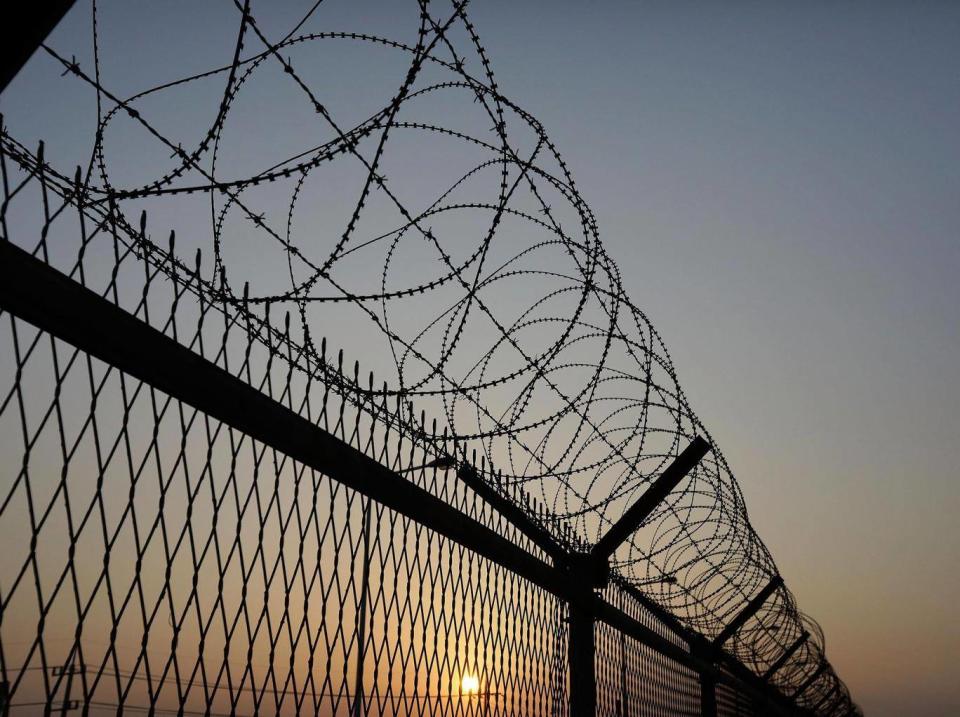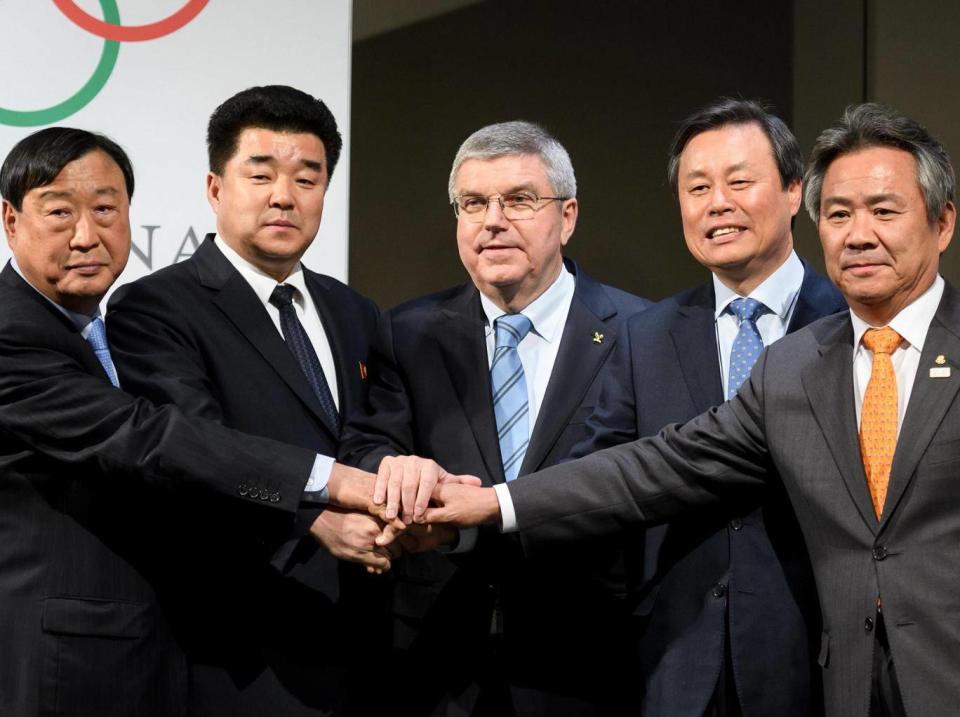'The Olympic Games build bridges, not walls': Can sport really hope to repair the wounds of North and South Korea?

In 2004, as part of a period of economic and diplomatic rapprochement that would come to be known as the Sunshine Policy, South Korean manufacturers were invited to establish factories in the North Korean town of Kaesong. As well as technology, infrastructure and expertise, the South Koreans brought over the border with them something that would have a far more immediate and resonant impact: a popular South Korean marshmallow and chocolate biscuit snack called the Choco Pie.
The Choco Pie proved an instant hit: so popular with the locals that over the following years, more and more began to find their way illicitly over the border, to feed what became a thriving black market. South Korean firms began to pay their staff in Choco Pies instead of cash, which was subject to heavy taxation. Low-ranking North Korean officials would accept them as bribes.
At one point, it is estimated that 150,000 Choco Pies were in circulation on an average day in Kaesong alone, where they would be bought and sold for the equivalent of one month’s salary. Stunned and enraged at this unexpected outbreak of Western commerce, the North Korean state at first tried to restrict workers to a maximum of two pies a day, then banned them altogether, and then began manufacturing their own version.
And as North and South Korea pave the way for their latest and perhaps most unexpected attempt yet at detente – an agreement that will see North Korean athletes competing at next month’s Winter Olympics in Pyeongchang – the lesson of the Choco Pie remains apposite. As the foreign correspondent and east Asia expert Richard Lloyd Parry put it in the London Review of Books: “Whenever they have been given the opportunity to sample the products of the outside world, North Koreans have seized it.”
***
“The Olympic Games are always about building bridges; they never erect walls,” said Thomas Bach, the president of the International Olympic Committee, in Lausanne on Saturday. Either side of him stood officials from North and South Korea, shaking hands after sealing an agreement with the potential to reshape the geopolitics of the region. North Korea will send 22 athletes to Pyeongchang to compete in five sports. The women’s ice hockey team will compete under a unified Korean banner. The two countries will march under a single flag at the opening ceremony on 9 February.
“Let us not forget that such an agreement would have seemed impossible only a few weeks ago,” Bach said. “The Olympic spirit is about respect, dialogue and understanding. The Winter Games are hopefully opening the door to a brighter future on the Korean peninsula, and inviting the world to join in a celebration of hope.”
To glimpse the other side of the argument, you only had to look at the pictures coming out of Seoul on Monday. As a North Korean delegation arrived in the South Korean capital, they were met by a group of conservative protesters waving banners, shouting anti-Pyongyang slogans and burning a picture of North Korean leader Kim Jong-Un. The delegation was in Seoul to inspect venues for a joint cultural event to take place in conjunction with the Games, and was led by Hyon Song-Wol, a member of the popular North Korean girl group Moranbong Band, whose best-known songs include “Victory”, “My Country Is The Best”, and “Let’s Study!”

Moon Jae In, the liberal president of South Korea, believes the Olympic agreement can pave the way for broader peace talks between the two Koreas, after months of rising tensions, nuclear missile tests and escalating rhetoric between North Korea and the United States. It provides, he said, a “precious chance to open the door”. Opinion polls show that a small majority of South Koreans are backing his approach for now.
His critics, on the other hand, contest that Moon is being played by the North Koreans like a charity shop harmonica. They argue that rolling out the red carpet for North Korea legitimises and normalises it as a nuclear state, a ruthlessly repressive state, one that has engaged in numerous acts of aggression – physical and cyber – on the West. They contend that North Korea’s true mission is not peace, but to politicise, destabilise and divide South Korean society, perhaps even fracture its alliance with the United States.
Who knows, they might even be right. Perhaps the whole thing is just an elaborate ruse, a smokescreen for some nefarious manoeuvre that will make everybody furious. Or perhaps this really could be the start of something. Predicting what will happen on the Korean peninsula tomorrow morning, let alone over the next few months or years, has long been a fool’s errand. But for those on the other side of the world, watching from afar, the sudden thaw in relations between the two countries raises a question that has implications for all of us. Is the idea of sport as a force for good just that: a line we spin to make ourselves feel good? Or can sport actually make the world a better place? Can sport – and perhaps we are straying well out of our lane here, but let’s do it anyway – can sport stop wars?
***
The Olympics wasn’t always about building bridges. In September 1981, in Baden-Baden, Germany, the IOC awarded the 1988 Summer Games to Seoul. After the damp squibs of Montreal in 1976 and Moscow in 1980, the Olympics had never been less popular. They were, it was generally believed, on their last legs as a concept. And so when the announcement was made, it created barely a ripple in most of the world, with the exception of three countries. Japan, whose city Nagoya was the beaten candidate, South Korea, and its communist neighbour to the north, who saw in the Seoul Olympics the makings of a total propaganda disaster.

The two Koreas had been at loggerheads since the 1953 armistice that ended the Korean War. And yet what is often forgotten these days is that South Korea in the 1980s was barely more free than the North. Its president, Chun Doo Hwan, had seized power in 1979 in a military coup, and was presiding over a repressive regime characterised by the imprisonment of opposition politicians and the brutal suppression of a student protest in Gwangju in which up to 2,000 pro-democracy campaigners were massacred.
And so, when the IOC sat down with South Korea to map out the route to the 1988 Games, their main motivation was not to unite the peninsula, or strike a blow for geopolitical unity. Their job was to save the Olympics from the sort of grievous blow that might have finished it for good as a sporting movement, be it terrorism (as seen at Munich in 1972), financial ruin (Montreal 1976) or mass boycott (Moscow 1980, Los Angeles 1984). With Cold War tensions at their height, and a piqued Communist neighbour to the north, the last of these was clearly the principal threat.
North Korea, for their part, saw the Games as a pivotal step towards their eventual goal of uniting the two countries. At first, they demanded to co-host the Games. After several rounds of tense negotiations, they were offered the chance to host five events: football, archery, table tennis, volleyball and the cycling road race. But for whatever reason, the deal never happened. There are claims that the IOC reneged on previous offers to allow them to host the entire football tournament rather than some preliminary games. North Korea’s involvement in the bombing of a South Korean passenger aircraft in 1986, killing 115 people, further set back relations between the two countries.
And correspondence between the IOC and the South Korean organising committee suggests that their objective was never to share hosting rights with North Korea, but simply keep them at the negotiating table long enough to ward off a mass communist boycott. “You must be very careful,” Chun wrote to IOC president Juan Antonio Samaranch. “It is impossible to expect goodwill or cooperation on their part. If one gives one finger to North Korea, they will take the whole hand.”
Having come agonisingly close to hosting the Games, North Korea ultimately boycotted them altogether. The success of the Seoul Olympics, which paved the way for the more democratic, economically prosperous, outward-looking South Korea that would emerge in the 1990s, ended up being a massive PR blow for the North, which suffered grievously at the hands of economic sanctions and its own callous leaders. “No one, except the North Korean government itself,” writes Parry, “believed the DPRK would survive into the second decade of the 21st century. Two things made this possible: China and nuclear weapons.”
***
And so, after numerous false starts, endless warmongering and sabre-rattling, here we are again, at what may well be another fork in the road. The capacity for sport to effect meaningful geopolitical or diplomatic change is often overstated: a baseball series between the Baltimore Orioles and the Cuban national team in 1999 did little to improve the relationship between the two countries. The 1914 Christmas Day football truce between British and German soldiers, meanwhile, is a heartwarming tale, but shouldn’t obscure the fact that the two armies carried on trying to murder each other for another four years.

Perhaps this temporary rapprochement between North and South Korea will come to nothing. Perhaps it’s simply a sticking-plaster that can be ripped off at a moment’s notice. But the first step to treating a wound, after all, is to stop the bleeding. And perhaps, in the face of overwhelming evidence, it’s possible to keep wondering. To wonder whether a few skiers and ice hockey players really can push the door open. To wonder whether the Olympics really can live up to its lofty ideals.
To wonder whether even the merest glimpse of a universe beyond its heavily-fortified borders might just stir something in ordinary North Koreans. Last month, a North Korean soldier called Oh Chong Song took on a death mission. He tried to escape over the border to South Korea, running the gauntlet of watchtowers, barbed wire and loaded rifles. He was shot in the knee, the arm, the back, the chest and the shoulder. Miraculously, he made it over the border and survived. When he finally came to in a South Korean hospital bed, the first thing he asked for was a Choco Pie.

 Yahoo News
Yahoo News 
